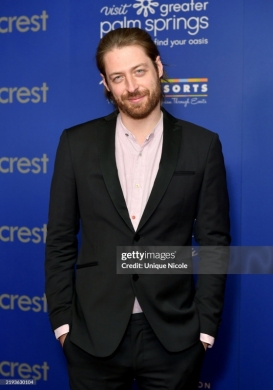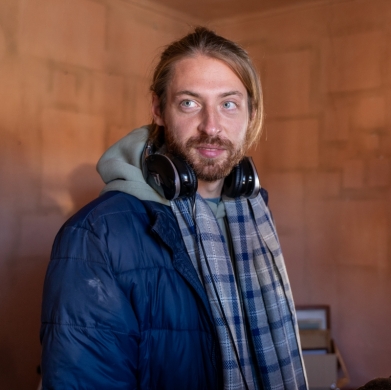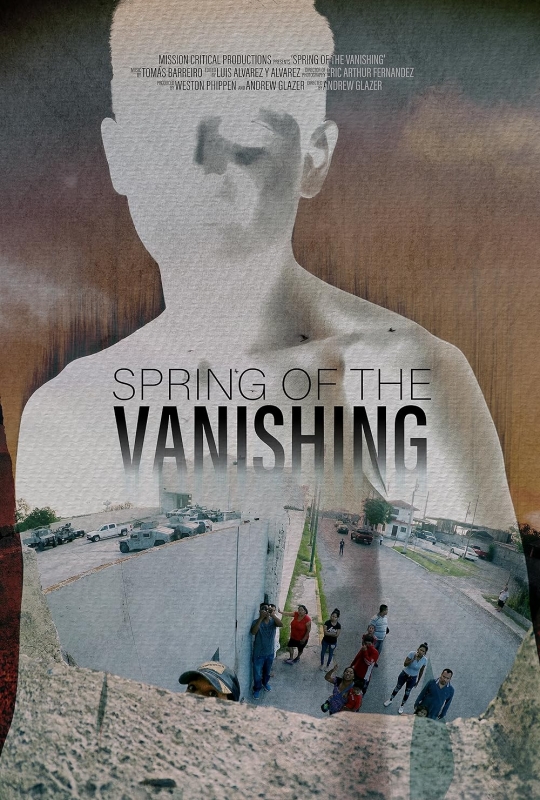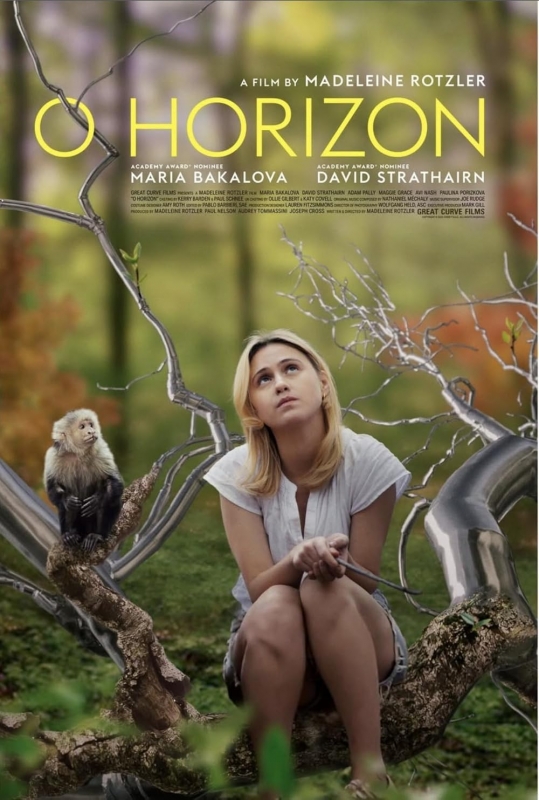Passes are available NOW - get yours to reserve your seats before individual tickets go on sale April 1!
|
|
|
|
|
|
 Director Gabriele Fabbro Director Gabriele Fabbro
Named by MovieMaker Magazine as one of the top 2022's screenwriters to watch, Gabriele Fabbro was born in 1996, in Milan, Italy. He's a film director with a BFA degree in Filmmaking from the New York Film Academy. Since 2011, he wrote, directed and produced over 30 productions including features, short films, music videos and commercials. Among his most recent works, he directed the music video "If You Run (2020)" for Josh Homme (Queens of the Stone Age). His latest short film "8 (2019)" screened at the 76 Venice Film Festival and his first feature film "The Grand Bolero (2021)", premiered at the 2021 Austin Film Festival, was one 2022's most awarded features from Italy and was in competition for the David di Donatello Awards, Italy's equivalent to the Oscars. Gabriele’s latest work, “Trifole” (2024) premiered at the Palm Springs International Film Festival and is currently touring festivals around the globe.
In an interview with Director Gabriele Fabbro about his recent film, here is what he had to say:
Can you speak about where you are from, your background and how you got into film?
FABBRO: I was born in Milan, Italy, and grew up in the countryside surrounding the city. I've been drawn to film since childhood. As a kid, I used to sketch my favorite scenes from Disney’s '90s classics. I started shooting and editing videos in middle school and began seriously studying filmmaking. After high school, I moved to Los Angeles to attend the New York Film Academy, where I had the opportunity to refine my craft and begin working for the film industry, first as an editor then more and more as a director.
How difficult is it to make an independent film in Italy?
FABBRO: Compared to the US, I'd say it's much easier in terms of production but far more difficult in terms of promotion. In Italy, making a film is still seen as a significant cultural and artistic event, so people are generally more enthusiastic about helping with production. The country offers incredible locations and skilled crew members. Aside from national film funds, almost every region has its own film commission with separate funding systems, meaning there are more opportunities to secure a larger budget if you choose to shoot in Italy. The country produces around 300 films per year, all with decent budgets.
FABBRO CONT’D: However, the real challenge lies in promotion. The industry in Italy is quite insular, operating in a way that often feels like an exclusive club. Audiences, distributors, festivals, and critics tend to highlight filmmakers who are already famous or connected within the industry. The US, thankfully, is the opposite. I experienced this firsthand with my latest film, “Trifole” (2024). Despite having three of the most famous Italian actors in the cast, our production—being relatively new and not deeply established in the industry—was largely ignored by major festivals in Italy. Fortunately, we secured a nationwide theatrical distribution deal with Officine UBU, which properly promoted the film. However, it still feels as if Italy’s film industry prioritizes already-established names rather than discovering new talent.
FABBRO CONT’D: On the other hand, the U.S. remains a great place for promotion. While it has its own challenges, the industry actively finds space for emerging filmmakers and builds a star system around them. For example, in the US, where our ca
 Director Gabriele Fabbro Director Gabriele Fabbro
Named by MovieMaker Magazine as one of the top 2022's screenwriters to watch, Gabriele Fabbro was born in 1996, in Milan, Italy. He's a film director with a BFA degree in Filmmaking from the New York Film Academy. Since 2011, he wrote, directed and produced over 30 productions including features, short films, music videos and commercials. Among his most recent works, he directed the music video "If You Run (2020)" for Josh Homme (Queens of the Stone Age). His latest short film "8 (2019)" screened at the 76 Venice Film Festival and his first feature film "The Grand Bolero (2021)", premiered at the 2021 Austin Film Festival, was one 2022's most awarded features from Italy and was in competition for the David di Donatello Awards, Italy's equivalent to the Oscars. Gabriele’s latest work, “Trifole” (2024) premiered at the Palm Springs International Film Festival and is currently touring festivals around the globe.
In an interview with Director Gabriele Fabbro about his recent film, here is what he had to say:
Can you speak about where you are from, your background and how you got into film?
FABBRO: I was born in Milan, Italy, and grew up in the countryside surrounding the city. I've been drawn to film since childhood. As a kid, I used to sketch my favorite scenes from Disney’s '90s classics. I started shooting and editing videos in middle school and began seriously studying filmmaking. After high school, I moved to Los Angeles to attend the New York Film Academy, where I had the opportunity to refine my craft and begin working for the film industry, first as an editor then more and more as a director.
How difficult is it to make an independent film in Italy?
FABBRO: Compared to the US, I'd say it's much easier in terms of production but far more difficult in terms of promotion. In Italy, making a film is still seen as a significant cultural and artistic event, so people are generally more enthusiastic about helping with production. The country offers incredible locations and skilled crew members. Aside from national film funds, almost every region has its own film commission with separate funding systems, meaning there are more opportunities to secure a larger budget if you choose to shoot in Italy. The country produces around 300 films per year, all with decent budgets.
FABBRO CONT’D: However, the real challenge lies in promotion. The industry in Italy is quite insular, operating in a way that often feels like an exclusive club. Audiences, distributors, festivals, and critics tend to highlight filmmakers who are already famous or connected within the industry. The US, thankfully, is the opposite. I experienced this firsthand with my latest film, “Trifole” (2024). Despite having three of the most famous Italian actors in the cast, our production—being relatively new and not deeply established in the industry—was largely ignored by major festivals in Italy. Fortunately, we secured a nationwide theatrical distribution deal with Officine UBU, which properly promoted the film. However, it still feels as if Italy’s film industry prioritizes already-established names rather than discovering new talent.
FABBRO CONT’D: On the other hand, the U.S. remains a great place for promotion. While it has its own challenges, the industry actively finds space for emerging filmmakers and builds a star system around them. For example, in th
 Director Gabriele Fabbro Director Gabriele Fabbro
Named by MovieMaker Magazine as one of the top 2022's screenwriters to watch, Gabriele Fabbro was born in 1996, in Milan, Italy. He's a film director with a BFA degree in Filmmaking from the New York Film Academy. Since 2011, he wrote, directed and produced over 30 productions including features, short films, music videos and commercials. Among his most recent works, he directed the music video "If You Run (2020)" for Josh Homme (Queens of the Stone Age). His latest short film "8 (2019)" screened at the 76 Venice Film Festival and his first feature film "The Grand Bolero (2021)", premiered at the 2021 Austin Film Festival, was one 2022's most awarded features from Italy and was in competition for the David di Donatello Awards, Italy's equivalent to the Oscars. Gabriele’s latest work, “Trifole” (2024) premiered at the Palm Springs International Film Festival and is currently touring festivals around the globe.
In an interview with Director Gabriele Fabbro about his recent film, here is what he had to say:
Can you speak about where you are from, your background and how you got into film?
FABBRO: I was born in Milan, Italy, and grew up in the countryside surrounding the city. I've been drawn to film since childhood. As a kid, I used to sketch my favorite scenes from Disney’s '90s classics. I started shooting and editing videos in middle school and began seriously studying filmmaking. After high school, I moved to Los Angeles to attend the New York Film Academy, where I had the opportunity to refine my craft and begin working for the film industry, first as an editor then more and more as a director.
How difficult is it to make an independent film in Italy?
FABBRO: Compared to the US, I'd say it's much easier in terms of production but far more difficult in terms of promotion. In Italy, making a film is still seen as a significant cultural and artistic event, so people are generally more enthusiastic about helping with production. The country offers incredible locations and skilled crew members. Aside from national film funds, almost every region has its own film commission with separate funding systems, meaning there are more opportunities to secure a larger budget if you choose to shoot in Italy. The country produces around 300 films per year, all with decent budgets.
FABBRO CONT’D: However, the real challenge lies in promotion. The industry in Italy is quite insular, operating in a way that often feels like an exclusive club. Audiences, distributors, festivals, and critics tend to highlight filmmakers who are already famous or connected within the industry. The US, thankfully, is the opposite. I experienced this firsthand with my latest film, “Trifole” (2024). Despite having three of the most famous Italian actors in the cast, our production—being relatively new and not deeply established in the industry—was largely ignored by major festivals in Italy. Fortunately, we secured a nationwide theatrical distribution deal with Officine UBU, which properly promoted the film. However, it still feels as if Italy’s film industry prioritizes already-established names rather than discovering new talent.
FABBRO CONT’D: On the other hand, the U.S. remains a great place for promotion. While it has its own challenges, the industry actively finds space for emerging filmmakers and builds a star system around them. For example, in the US, where our cast is unknown, we still managed to get int

Spring of the Vanishing
Santa Barbara international film festival
Interview with investigative reporter Andrew Glazer and J. Weston Phippen (producer)., by Emmanuel Itier
Watch the trailer!

O HORIZON
Santa Barbara film festival
Interview with director: Madeleine Rotzler, by Emmanuel Itier
Having lost my dad recently I can identify to Madeleine Rotzler splendid new film: ‘O Horizon’. In this film, Abby, played by the talented Maria Bakalova, is developing a new technology to talk with her deceased father, Warren, played by maestro David Strathairn. Madeleine has assembled a very poetic and charming movie with a deep soul. Her choice of perfect shots is enhancing this very emotional movie and once can only reflect about its own mortality and its family relationship. ‘O Horizon’ won the Panavision Spirit Award for Independent Cinema, last week, at the Santa Barbara International Film Festival. We were there to meet with Madeleine and get more insights about her brilliant jewel of a movie.
Q: What inspired you to make this film?
Madeleine: I wrote the movie during Covid. That’s when a lot of people were not able to be with their loved ones when they passed away. Like everybody I spent lots of time alone at home. I was thinking and imagining what it would be life if you could talk again to the ones you lost. The idea for the AI was just meant to be a fable. I wanted to write something fantastical and not grounded in reality. But, also something that didn’t disregard all of the hard things we go through. So, I came up with the idea of that technology. And since then, it became more and more of a reality, which I didn’t expect at all. It’s very different watching the movie now. Even every month I was watching it, finishing the film, it’s all different each time.
Q: What are the other themes you were trying to explore? What is this film truly talking about?
Madeleine: For me it’s really a father daughter story. The world of it is hopefully what draws you into it. I come from making a lot of documentaries and the first fiction film that I made I found it in prison with mostly men incarcerated as actors. Covid hit just after that film came out. I wanted to spend more time somewhere else. And so, I saw this new film as an alternate reality and how can we build a world that feels a little bit different. I hope I build a movie that feels different and colorful in spite of her dealing with a loss. I hope I created an uplifting story about loss. Loss is not something we spend too much time looking at or thinking about. I find myself in denial about it and not wanting to think about it. And so, I’m not ready for it when it happens. This is where we find her. And no amount or knowledge can prepare us for the hardship of losing a loved one.
Q: Tell me about the various challenges you faced making this movie?
Madeleine: The cinematographer and I had made lots of films together and we joked at the idea of making a film in N.Y cannot be harder than making a film in a maximum-security prison. We are both from New York and we love this city. New York has been used in so many ways so it’s a challenge to make New York feel different. We were so lucky to have an amazing location manager named Ryan. We scouted over 30 apartments for her own apartment. The one in the film is the very last one we found. It was a challenge, but we kept looking and we found the perfect locations. Also, I had a much bigger crew than the movie I made in the prison (‘O.G’ -2018) and shooting in N.Y is lots more organization. The production itself was quite complicated. Because I have done many documentaries, I’m used to things un-expected to happen. And so, w

O HORIZON
Santa Barbara film festival
Interview with director: Madeleine Rotzler, by Emmanuel Itier
Having lost my dad recently I can identify to Madeleine Rotzler splendid new film: ‘O Horizon’. In this film, Abby, played by the talented Maria Bakalova, is developing a new technology to talk with her deceased father, Warren, played by maestro David Strathairn. Madeleine has assembled a very poetic and charming movie with a deep soul. Her choice of perfect shots is enhancing this very emotional movie and once can only reflect about its own mortality and its family relationship. ‘O Horizon’ won the Panavision Spirit Award for Independent Cinema, last week, at the Santa Barbara International Film Festival. We were there to meet with Madeleine and get more insights about her brilliant jewel of a movie.
Q: What inspired you to make this film?
Madeleine: I wrote the movie during Covid. That’s when a lot of people were not able to be with their loved ones when they passed away. Like everybody I spent lots of time alone at home. I was thinking and imagining what it would be life if you could talk again to the ones you lost. The idea for the AI was just meant to be a fable. I wanted to write something fantastical and not grounded in reality. But, also something that didn’t disregard all of the hard things we go through. So, I came up with the idea of that technology. And since then, it became more and more of a reality, which I didn’t expect at all. It’s very different watching the movie now. Even every month I was watching it, finishing the film, it’s all different each time.
Q: What are the other themes you were trying to explore? What is this film truly talking about?
Madeleine: For me it’s really a father daughter story. The world of it is hopefully what draws you into it. I come from making a lot of documentaries and the first fiction film that I made I found it in prison with mostly men incarcerated as actors. Covid hit just after that film came out. I wanted to spend more time somewhere else. And so, I saw this new film as an alternate reality and how can we build a world that feels a little bit different. I hope I build a movie that feels different and colorful in spite of her dealing with a loss. I hope I created an uplifting story about loss. Loss is not something we spend too much time looking at or thinking about. I find myself in denial about it and not wanting to think about it. And so, I’m not ready for it when it happens. This is where we find her. And no amount or knowledge can prepare us for the hardship of losing a loved one.
Q: Tell me about the various challenges you faced making this movie?
Madeleine: The cinematographer and I had made lots of films together and we joked at the idea of making a film in N.Y cannot be harder than making a film in a maximum-security prison. We are both from New York and we love this city. New York has been used in so many ways so it’s a challenge to make New York feel different. We were so lucky to have an amazing location manager named Ryan. We scouted over 30 apartments for her own apartment. The one in the film is the very last one we found. It was a challenge, but we kept looking and we found the perfect locations. Also, I had a much bigger crew than the movie I made in the prison (‘O.G’ -2018) and shooting in N.Y is lots more organization. The production itself was quite complicated. Because I have done many documentaries, I’m used to things un-expected to happen. And so, w
|
|
|
|
|
|